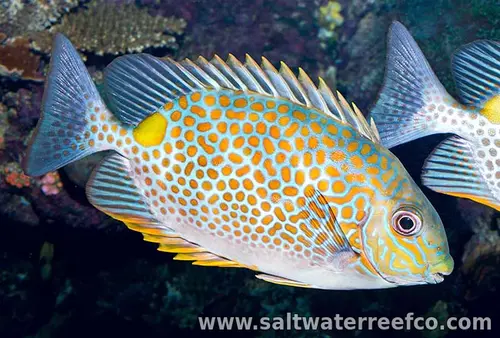At SaltwaterReefCo, we love helping our clients create thriving aquatic environments, and few saltwater fish bring as much peaceful herbivorous energy and striking appearance to a reef tank as the Rabbitfish. These fascinating and gentle marine fish, primarily from the family Siganidae, are adored by aquarists for their rabbit-like faces, unique body patterns, and their reputation as dedicated algae grazers.
While generally considered a hardy and peaceful addition to a marine aquarium, Rabbitfish have specific needs that must be met to ensure they flourish. Their herbivorous diet and unique defense mechanisms require a stable, well-maintained system with careful consideration of tank mates. Here's what you need to know about keeping these magnificent creatures:
Tank Requirements
Rabbitfish are active, open-water swimmers that spend their days grazing on algae and exploring their environment. They require plenty of open swimming space and a well-structured rockscape.
Minimum Tank Size: Rabbitfish are medium to large fish, so a minimum of a 75-gallon aquarium is recommended, with larger tanks (125 gallons or more) being ideal to provide adequate space and prevent stress.
Aquascaping: Provide ample live rock with plenty of stable caves, crevices, and overhangs. These structures offer hiding spots and a sense of security. It is important to note that while they are generally considered reef-safe with most corals, some species may occasionally nip at soft corals.
Filtration & Flow: Robust filtration (sump, protein skimmer, refugium) is crucial for maintaining pristine water quality. As large, active fish, they produce a significant bio-load, and a strong filtration system is needed to handle it. Moderate to strong water flow is generally appreciated.
Water Parameters
Rabbitfish are marine fish and demand stable, high-quality saltwater conditions, typical of a healthy reef tank.
Temperature: Maintain a consistent water temperature between 74-80°F (23-27°C).
pH: A stable pH range of 8.1 to 8.4 is ideal.
Water Changes: Regular partial water changes (10-20% weekly or bi-weekly) are essential for replenishing trace elements and preventing nutrient buildup.
Diet and Feeding
Rabbitfish are herbivores, and their diet is a critical aspect of their care. A diet rich in algae is necessary to maintain their health and prevent them from nipping at corals.
Varied Diet: Offer a diverse diet of plant-based foods. Excellent options include:
- High-quality marine herbivore flakes or pellets
- Nori sheets (seaweed) attached to a clip
- Spirulina-based foods
Algae Control: Rabbitfish are fantastic natural algae grazers and will help keep your tank clean of nuisance algae.
Feeding Frequency: Feeding once a day is generally sufficient, but providing a constant supply of algae sheets is beneficial.
Tank Mates
Rabbitfish are generally peaceful fish, but they can be aggressive towards other Rabbitfish. Their venomous spines serve as a deterrent to most predators.
Good Tank Mates: Other peaceful to semi-aggressive reef fish of a similar size. Good options include:
- Tang species
- Wrasses
- Cardinalfish
- Clownfish
- Damsels
Avoid:
Very Small, Docile Fish: While generally peaceful, some small, very timid fish may be bullied.
Other Rabbitfish: Avoid keeping more than one Rabbitfish unless it is a mated pair in a very large tank, as they can be territorial with their own species.
Invertebrates: Be cautious with some invertebrates, though they are generally considered reef-safe.
Common Health Concerns
Maintaining optimal water quality and a consistent, nutritious feeding schedule is the best defense against disease in Rabbitfish. Like all fish, they can be susceptible to common marine ailments:
Ich (Cryptocaryon irritans): A common parasitic infection causing small white spots.
Marine Velvet (Amyloodinium ocellatum): A highly contagious parasitic infection, often appearing as a dusty coating.
Stress: Poor water quality, inappropriate tank mates, or insufficient swimming space can lead to stress, making them susceptible to other diseases.
Venomous Spines: A key safety concern for aquarists. Be careful when handling a Rabbitfish, as the spines on their dorsal, anal, and pelvic fins contain venom that can cause a painful sting.
Prevention is key! Always quarantine new fish for 4-6 weeks, maintain pristine water conditions, and provide a species-appropriate diet. If you notice any signs of illness, prompt diagnosis and treatment are crucial.
At SaltwaterReefCo, we understand the unique needs of Rabbitfish and offer specialized aquarium maintenance services to ensure their health and well-being. From comprehensive water testing and advanced filtration solutions to tailored feeding regimens and disease prevention, we're here to support your passion for these spectacular marine jewels.
Ready to bring the peaceful beauty of a Rabbitfish to your reef, or need expert care for your existing tank? Contact us today for a consultation in Highland Park, Illinois, and surrounding communities!
